Summary 
Outdoor comedy closely follows Shakespeare's text but adds a strolling musician and a racially provocative Puritan Malvolio. A well-acted entertainment featuring a spunky Viola in the pivotal role, with standard Elizabethan setting and costuming, but also with some dark edges, including a mean-spirited Feste, a homosexually infatuated Antonio, and a Fabian in wig and costume as if from another play altogether.
Design
Directed by David Frank. Costume and Scenic design by Robert Morgan. Lighting Design by Michael A. Peterson. Sound design and original music by Sarah Pickett.
Cast
Sarah Pickett (Musician), Marcus Truschinski (Orsino), Cristina Panfilio (Viola), Susan Shunk (Olivia), Brian Mani (Sir Toby Belch), Greta Wohlrabe (Maria), Mark Goetzinger (Sir Andrew Aguecheek), John Taylor Phillips (Feste), La Shawn Banks (Malvolio), Steve Haggard (Fabian), Eric Parks (Antonio), Samuel Ashdown (Sebastian).
Analysis
David Frank, artistic director for American Players Theatre, directs the company's Twelfth Night at the Up the Hill Theatre space, deep in the middle of a southern Wisconsin wood. Frank follows the script and its sequence closely, although adding a strolling choric musician, composer Sarah Pickett, who plays a low-key somber score on flute and recorder. Costumes and setting are also standard Elizabethan, though evocative: black boots, ruff collars, and swords, as well as dead leaves, dark burnished metal, and doors and gates topped with sharp spikes. Frank highlights the darker overtones of the story, lingering on the 1.1 funeral of Olivia's brother, with offstage choral singing and a tolling church bell, a somber march of black-clad mourners, and slow sad music from Pickett that becomes even slower and sadder with a frown and a clap of the hands from Malvolio. The only slightly light moment is the stagger and cough of an obviously drunken Toby, played by Brian Mani with a whacked out gray afro and goatee and a lurching Tim Curry-like sneer and leer. Frank then segues into the thunder-and-lightning rumble of the shipwreck, with Cristina Panfilio's long-blonde-haired Viola and three ragtag sailors apparently the only survivors.
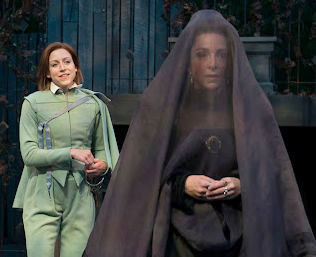
Panfilio's Viola is the highlight of the production, a plucky and likeable heroine facing danger - or at least embarrassing entanglements - on a number of levels. Expressive and brave, Panfilio's Viola still seems very feminine in cute-cropped strawberry blonde hair, and she wears a light green pants suit - like her survivor brother, Sebastian - so the two of them are a welcome splash of color in the dour depths of Illyria. During 1.5, she lingers stage right practicing her lines and banter, and when she meets Orsino's beloved, Olivia seems her opposite in every detail: dark hair, somber expression, clad entirely in black, and bleak in spirit. Panfilio's animated "Cesario" is quicksilver clever - "if God did all" - and impressively impassioned, giving a rousing Tarzan yell as she cries out Olivia's name. When she strides offstage right - "farewell, fair cruelty" - she has left her opposite in breathless wonder, and she makes a realization 2.2 regarding Olivia's sudden ardor with a doleful, "I am the man."
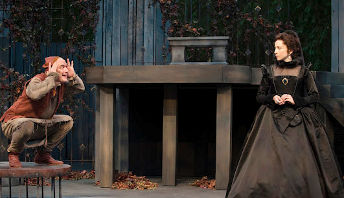
Olivia's household, despite her own funereal presence and the Puritanical ignorance of Malvolio, manages some amusing moments. Mani's Toby swaggers in like Johnny Depp's Captain Jack Sparrow, struggling mightily while Sir Andrew fails, leaning face first against a wall for a moment's rest. They are followed by a bald-headed Feste, sharp of tongue and mean of eye, having abused Olivia in 1.5 - "the fool will look to the madman" - and grimacing from a whiff of Andrew's breath. Feste leads them in drunken three-part harmony through a romantic ballad, finishing with a lilt that has Toby puckering up and murmuring - "kiss me, kiss me, kiss me" - then kissing the top of Feste's shaved head. Feste seems out of place among the dark-clad Illyrians, and his snappish delivery and waspish eyes seem more than a little devilish and quite angry. And La Shawn Banks' Malvolio, prancing out in anger to scold the trio - and scaring away Pickett, who flees upstage and across the APT grounds - seems more akin to the jester than usual: a dark-skinned Puritan, set apart and perhaps reviled for no good reason at all, resorting to haughty anger and a vicious tongue to take his revenge. Banks' precise Malvolio - threatening them "by this hand" - makes a point to show each of them his right hand, in turn, drawing a laugh before stomping offstage, as Toby bemoans the fact that "it's too late to go to bed, now."
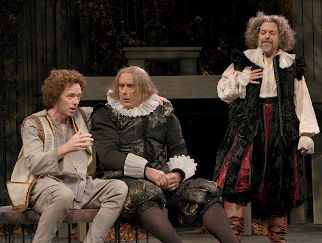
Even a role as small as Fabian comes across oddly, a curly-haired household worker wearing modern clothing and sporting an unfamiliar accent. Standing out almost as much as the on-the-edge jester Feste or the ostracized African-American (and ostracizing Puritan) Malvolio, the head-scratching portrayal does not fit well. But Fabian plays an integral role in the 2.5 deception in which Banks' Malvolio just about steals the show. He boasts of his potential advancement - rare for "one of my complexion" - then pulls the wax from the bogus letter with a high-pitched squeal. The deception is so complete, Malvolio positively beams, leaning far forward to force out a toothy smile for the audience - "I thank the stars; I am happy" - and Fabian, Toby, and Andrew are so impressed with Maria's wiles that they each place their head on a center stage table for her to step on their neck as the show reaches intermission.
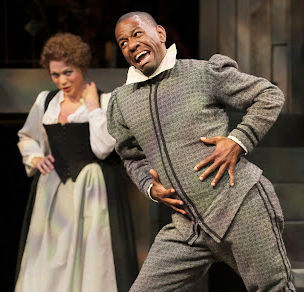
Banks' Malvolio indeed seems demonically possessed during his 3.4 humiliation, giving Olivia a big showy knowing wink, limping from the tightness of his garters, and thrusting suddenly and violently toward her - "some have greatness thrust upon them" - to display his yellow stockings. Banks' scene-stealing continues as he gives Olivia such a big smile he can hardly see, and he tries to look around the stage for her while maintaining a massive smile and an outlandish thrust pose. Olivia stammers and pumps her fists in frustration while Toby and Fabian step backward groaning with pretend fear. Malvolio's 4.2 "punishment" seems horribly harsh, confined within a prison cell buried beneath the stage, lunging for bars and a breathing hole a few feet above ground. And Feste's almost-sadistic Sir Topaz tortures him in an exaggerated Spanish accent, wearing black round glasses and a fake beard with a frock for no apparent reason, since Malvolio cannot see him. Only Malvolio's hands are visible, clutching at the bars - "there is no darkness but ignorance" - although once he lunges upward with desperation, his face pressed straining against the bars of the cage.
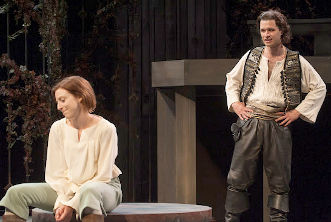
Panfilio's Viola gamely resists falling for the tall and long-haired Orsino, sitting beside him 2.4 as a hung over Feste sings "Come Away Death" for them. She and Orsino do a double take, but while "Cesario" appears appalled at the darkness of the lyrics, Orsino is visibly moved, bowing his head and holding his hand to his chest. Viola enjoys the proximity to her newfound love, and when he gives her a ring, she cradles it to her bosom and later shows inner resolve and acceptance - "I am what I am!" - in her banter with the clown. Her big physical scene is the 3.4 duel with the equally cowardly Andrew. She tries to sneak away past Fabian as Toby's booming voice resounds - "Fabian can scarce hold him!" - and she can barely draw her weapon. When Antonio arrives to break up the fight - shouting "put up thy sword!" - both she and Andrew scream and throw their weapons aside.
Antonio, a tough-guy sailor, is imbued by Frank with something of an homosexual ardor for Viola's brother, Sebastian. Their 3.3 embrace is awkward and uneasy, as is his over-reaction to the duel with Andrew, and when Sebastian reveals himself as not just in love with, but married to, Olivia, Antonio moves to the side of the stage, sits dejectedly, and hangs his head. When Sebastian, like Antonio earlier, becomes involved in the fight between Andrew and Viola 4.1, Olivia races in to throw herself bodily in front of him, legs and arms splayed in comic protection. After the usual confusion - "husband! stay!" - both Andrew and Viola scream like little girls in terror when they see one another, and when Sebastian strolls across the stage, Panfilio's Viola brings about the happy conclusion: "how have you made division of yourself?" The reunion is suitably touching, a big embrace with Panfilio's Viola squealing with delight, despite the well-founded anger of the filthy Malvolio - "I will be revenged upon the whole pack of you" - in his soiled night dress. Along with a variety of startling and sometimes confusing touches - an African American Puritan, a mean-spirited clown, a homoerotic pirate hero, characters out of place - Frank's production entertains and concludes upon a happy note.
A version of this article was edited and published in Shakespeare Bulletin, Vol.30, No.4, Winter 2012